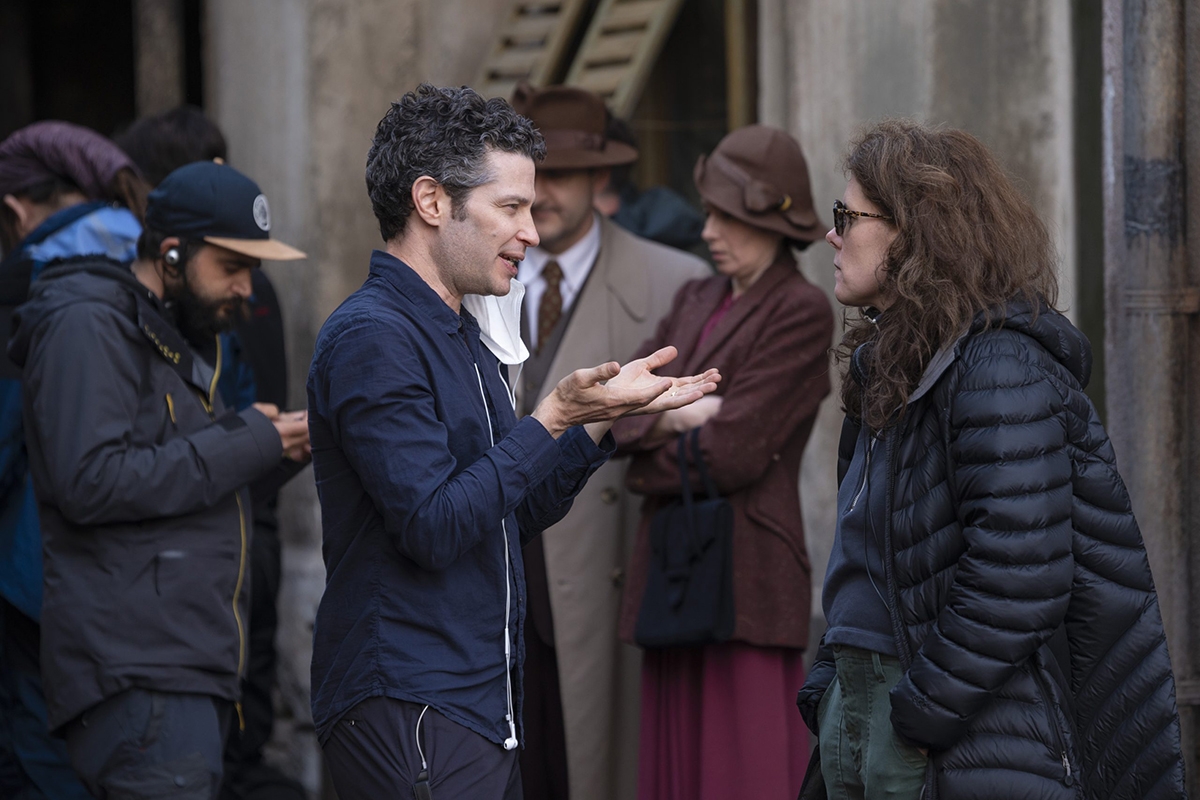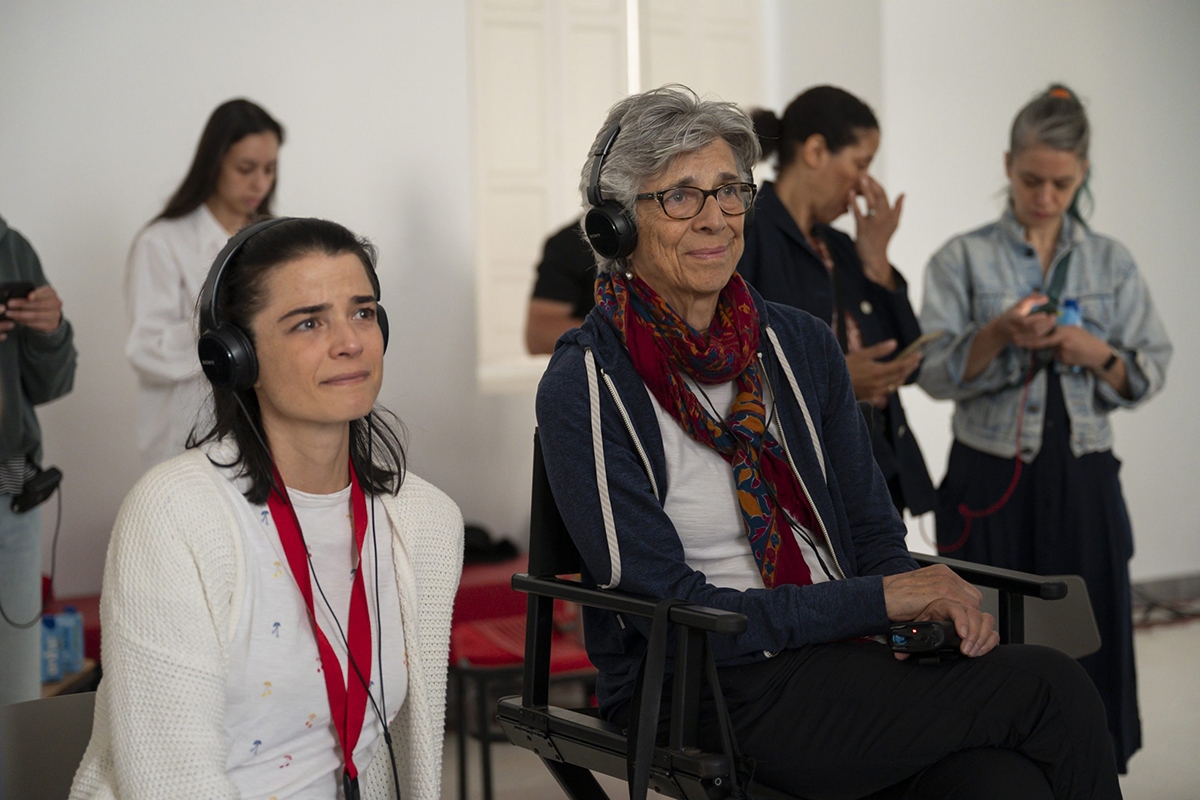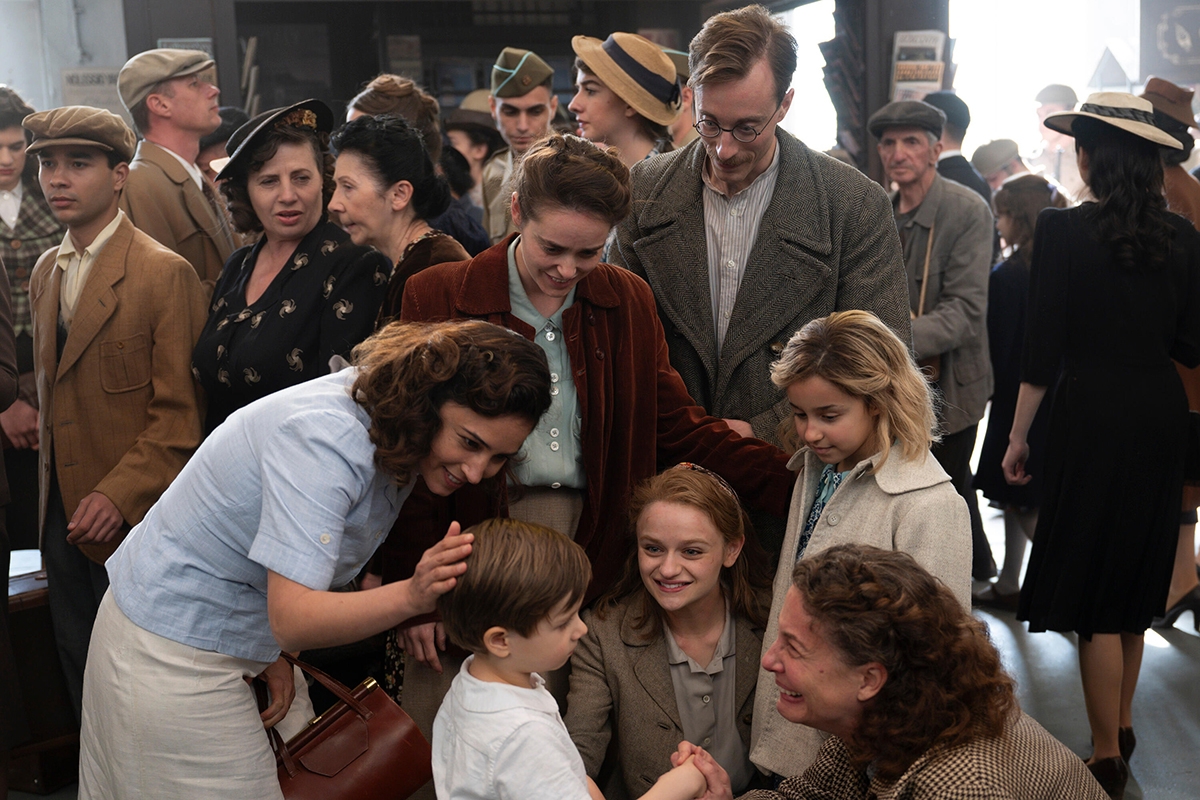Did you cry while watching the final episode of Hulu’s “We Were the Lucky Ones?” I sure did. There were tears of joy — like when the news that they all survived started to trickle in, and when they reunited first in Italy, then Rio. There were also tears of grief — when Sol and Nechuma go back to their family home in Radom and are shooed from their apartment door, when Nechuma breaks into an incandescent rage, or when, reunited at the family’s seder, everyone shares the names of relatives that they lost to the Holocaust — brothers, sisters, parents.
When speaking to many members of the cast and the team behind the show about the finale, it was clear that the finale was emotional for them as well. Here are some illuminating quotes from the team about the episode:
Erica Lipez (showrunner)
We have this postscript at the end of the series that shows what happened to the family, and there’s this moment where you just see these pictures come up of Georgia Hunter’s family: all of the grandkids, great-grandkids, all these big groups around tables all around the world. They’re such a vibrant, incredible family that I’ve gotten to know. I think that is what is lost with all of the people who did not make it through the Holocaust, and this is what we thankfully have from this family that did. It’s a really beautiful and emotionally bittersweet moment because it does, for me, evoke all of the people who are not around those tables because of what we lost during that time.
What I find always so compelling about the title of the book and show is, of course, you can take it quite literally. This family is a family who survives. But I think there’s so much irony in that title. I saw this also, just from reading other survivors’ accounts. People who survive often do describe themselves as lucky. They’re lucky to live, but what they went through, I mean, there’s nothing lucky about it. It’s what they then have to carry with them for the rest of their lives and the memories of those not there. It’s a really heavy burden to bear. And so I think there’s a lot of irony in that title, and a lot of hope, love and joy. There’s two sides of a coin in some ways.
Read our review of “We Were the Lucky Ones,” which features more quotes from Erica.

Thomas Kail and Erica Lipez on set, shooting the finale (via Vlad Cioplea/Hulu)
Thomas Kail (director)
Erica [Lipez] delivered such a gorgeous episode of television. We knew we had to bring this thing home; we’d put so much into it at that point. When that script came in, I just thought: She did it! Now my job is to go and realize that. The cast was so dropped in immediately, after now seven, eight, nine months of living with these characters. We could throw anything at them. They were just so inside that experience and those characters and I just felt the release of watching them reunite both as humans and as characters. Shooting that final Passover scene, it was such a big day: There was so much laughter and so much joy and so much pain, all of it right next to each other, which is Jewishness, right?
Georgia Hunter (author of “We Were the Lucky Ones”)
We all had little cameos in the finale. My boys and I came to Spain where we shot the last month and a half of our show and we had a little scene with Logan [Lerman] and it was really special. It was an action scene: Logan comes running down the street and kind of breaks into the middle of us and we fly away. My older one takes it less seriously. My younger one tells everyone he’s an actor. Those little moments are really sweet.
Seeing my mom on set was so moving. She had a little cameo with Logan as well. Hers was actually a longer, really beautiful moment where she’s standing behind him at a pier in Rio, and it’s a happy moment. I will never forget standing behind the camera and seeing her with the other extras and Logan walking onto the set and turning around and looking at her.
Also, as an aside, my great-grandmother only had a few things from the war but one of them was a brooch that she wore, and so we had it recreated for the show so Robin Weigert could wear it. But I brought the real one, so I put the real brooch on my mom and she just looks so gorgeous in her costume. Logan steps onto the set and turns and looks at her and goes, “This is so surreal,” and then he rubs the goosebumps on his arms and he goes, “I have chills.” I just lost it because that was the epitome of all of it, and I see it through her eyes and then through his eyes — it was too much.
I hope people can pick her out in the crowd when they watch the finale. She’s the woman in a rose pink top with a little silver brooch in a hat and white gloves.

Georgia and her mother, Isabelle, on set. (via Vlad Cioplea/Hulu)
Moran Rosenblatt (Herta)
About the scene at the end of the Passover seder when she, Adam, Selim, Nechuma and Sol read out the names of those they lost during the Holocaust: In the beginning, I talked to Erica and I said that I think their names need to be in the show. I’m not sure if they were from the beginning, but we all thought that they should be mentioned — the names of people who were murdered.
That scene fills the gap between her and her husband — her losing her whole family and him finding his family. It happens between Herta and Genek, and also between Jakob and Bella, and also Adam and Halina, and Mila and Selim. Every couple, one of them lost their family [and the other did not]. It’s a hard moment of mix between feeling angry that [your partner is] winning this amazing moment, reuniting with [his family] and trying to be happy for him. It’s my favorite scene of the whole show.
Also, that scene has the best line of Herta’s, for me, which is, “How are we supposed to start to live our lives now? We are so old.” The loss of the best years of her life, losing them to the war, and the need to start life over when she’s not at her peak, as she thinks. I love the sentence. It’s so nuanced and so small and so not melodramatic or big and heroic — it’s real stuff.
Read our interview with Moran.
Hadas Yaron (Mila)
On the reunification with Selim: We talked about how it feels, like it’s been so long, it’s been years, she thought he was dead… She did not believe he was alive, and then all of a sudden, it’s just so overwhelming. It’s such a sad and beautiful moment at the same time, because so much has happened in life for both of them. They were separated for so long. They both thought the other was dead, and then you kind of have to wake something up in you. You thought, I’m going to survive life without him and just somehow survive this life, and then this is happening — we have to readjust and get close again. It’s a very interesting moment.
Read our interview with Hadas.
Lior Ashkenazi (Sol)
On going back to Radom, where Sol realizes that the place he tried to hold onto for so long is no longer their home, and telling Halina and Nechuma they should leave: Tommy [Kail] told the extras, without us knowing, to look at [us], this family that just comes in who wants their property back, not with envy but with [hostility]. So it was easy for me to say, “No, we would not belong here anymore.” It’s not our place, I’m wrong, let’s go.
I know the family actually left everything behind and didn’t ask for it back. They were wealthy and well-settled and they finish with nothing, just with the clothes on their back. That’s amazing. They say in Aramaic “mi’igra rama lebira amiqta” — “from a high roof to a deep hole.”
Robin Weigert (Nechuma)
On that scene when she comes back home to Radom and yells at the people occupying her home: It was incoherent rage. A lot of times in this journey, I was doing a dance with the mysteries of acting, because I would use what I could do to open a door, but I never felt totally responsible for what would come through that door. I was surprised a time or two — and the volcanic nature of my rage was a surprise even to me.
The set [of the Kurc’s home] that you are welcomed into in the first episode had been struck by the time we shot that scene, but they reconstituted the part that I might see through the door, even though the lens of the camera never sees it. But I would see my own entryway when I looked through the crack in the door. More than that set, I had to mourn the life that I had with the cast members on that set. So there was this little layer of looking through the door at an actual situation I could never return to.
This whole experience was full of layers of reality overlapping with fiction in a way where your emotional life is just confused by it. Especially when we all bring our family histories into it and so there was a lot of actual sensation of what it is to have one’s home taken away. I’ve never had that. But I know going generations back [my family has], and people who are more expert than I am in Holocaust survivor stories, I’ve heard from a few of them. They speak about a kind of blood memory that isn’t from your own life.
I did an interview with a young [woman] that was being livestreamed and she asked, “Did you learn anything new about the Holocaust doing this series?” And I didn’t even think before giving the answer: I learned that the Holocaust lives in me. I hadn’t known it quite to this extent, how alive it was in me, the sense of what it is to lose one’s home. I’ve never had someone knock on my door and say you have half an hour to get out, but it was as if I have. So this was a gift on many levels, but one of them was that it opened me to things that exist in me that I didn’t know were there.
Read our interview with Robin.
If you’re dying to know more about the “We Were the Lucky Ones” finale, join us on Monday, May 6 at 8 PM ET for a conversation with showrunner Erica Lipez.








